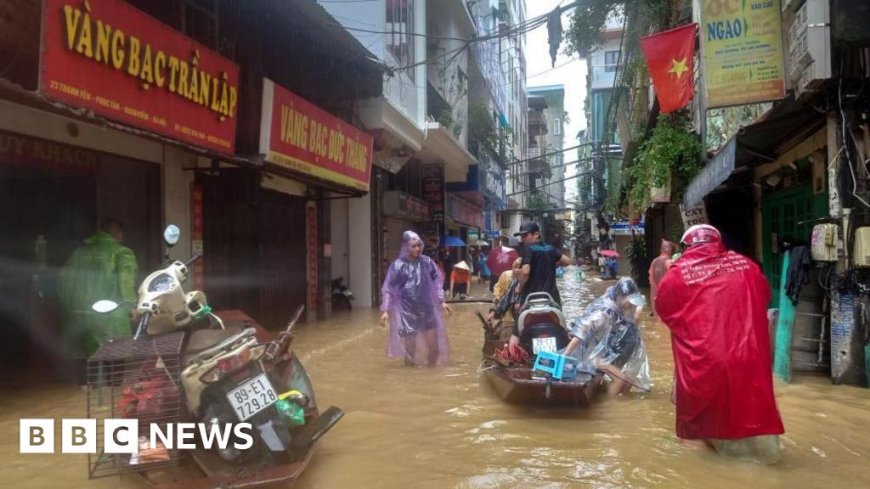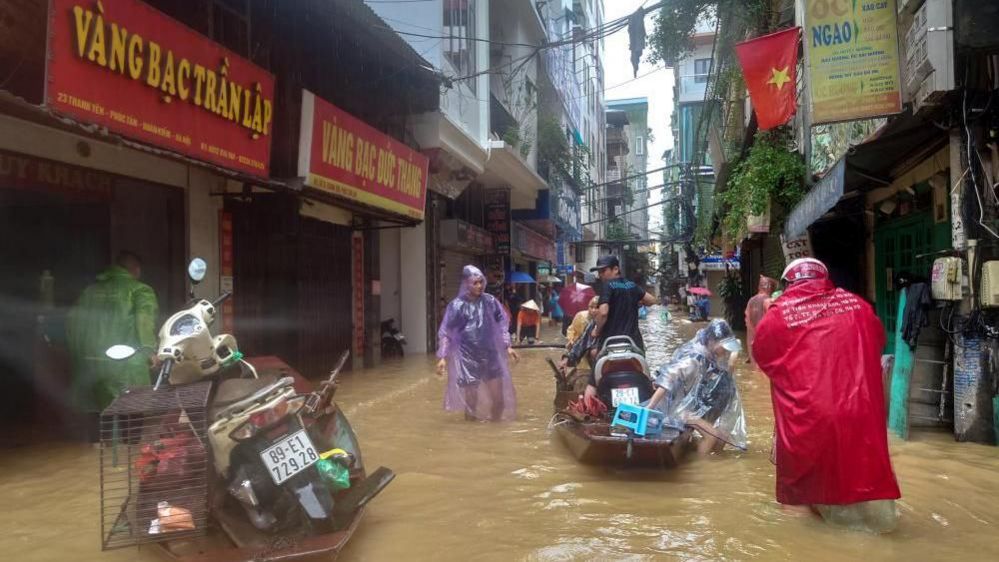Thousands flee Vietnam floods after typhoon hits
Image source, ReutersImage caption, Residents have been using boats to navigate their neighbourhoods as flood waters reached a metre highKelly NgBBC NewsPublished11 September 2024Thousands of people have been evacuated from low-lying areas in the Vietnamese capital, Hanoi, as the Red River surges to its highest level in two decades, flooding the streets.By Wednesday, flood waters from the swollen river reached a metre high in parts of the city, forcing some residents to navigate their neighbourhoods by boat.Power has been cut to some districts because of safety concerns, while 10 of Hanoi's 30 administrative districts are on "flood alert", state media reported.Vietnam is suffering the aftermath of Typhoon Yagi, which battered the north, killing at least 179 people. Floods and landslides across northern Vietnam have been the main causes of death, the government said."This is the worst flood I have seen," Hanoi resident Tran Le Quyen told Reuters news agency. "It was dry yesterday morning. Now the entire street is flooded. We couldn't sleep last night." Yagi, which was initially categorised as a super typhoon - the equivalent of a category 5 hurricane - but later downgraded to a tropical depression, has continued to wreak havoc in Vietnam since making landfall on Saturday.It has been described as Asia's most powerful typhoon this year."My home is now part of the river," Nguyen Van Hung, who lives in a neighbourhood on the banks of the Red River, told Reuters. An entire village, Lang Nu in the northern Lao Cai province, was swept away on Tuesday amid flash floods. At least 30 people have been confirmed dead, while hundreds of soldiers have been deployed to the village in search of those still missing.Hoang Thi Bay, one of 63 survivors in the remote mountain community, told the AFP news agency that she avoided being swept away by holding on to a pillar."I looked out of the window and saw a huge amount of land coming towards me," she said."I ran out to our kitchen, and clung tightly to a concrete pole. Our wooden stilt house was destroyed."Authorities are also paying careful attention on a hydropower plant in the northwestern Yen Bai province, as a huge inflow of water into the reservoir surrounding the dam raises concerns that it may collapse. Deputy Minister for Agriculture and Rural Development Nguyen Hoang Hiep said on Wednesday that the hydropower plant is "safe", but urged residents in the area to stay under shelter, as it may take up to two days for the water to recede to an "allowable level".Yagi has left a trail of destruction in the country's northern region over the past four days. On Monday, it collapsed a busy bridge, plunging ten cars and two scooters into the Red River. It also tore roofs from buildings, uprooted trees, and left widespread damage to infrastructure and factories in the north.Before hitting Vietnam, the typhoon left 24 people dead across southern China and the Philippines.Scientists have warned that as the world warms, typhoons can bring higher wind speeds and more intense rainfall, although the influence of climate change on individual storms is complicated.Additional reporting by BBC VietnameseRelated topicsVietnamAsiaSevere weather


Residents have been using boats to navigate their neighbourhoods as flood waters reached a metre high
- Published
Thousands of people have been evacuated from low-lying areas in the Vietnamese capital, Hanoi, as the Red River surges to its highest level in two decades, flooding the streets.
By Wednesday, flood waters from the swollen river reached a metre high in parts of the city, forcing some residents to navigate their neighbourhoods by boat.
Power has been cut to some districts because of safety concerns, while 10 of Hanoi's 30 administrative districts are on "flood alert", state media reported.
Vietnam is suffering the aftermath of Typhoon Yagi, which battered the north, killing at least 179 people. Floods and landslides across northern Vietnam have been the main causes of death, the government said.
"This is the worst flood I have seen," Hanoi resident Tran Le Quyen told Reuters news agency. "It was dry yesterday morning. Now the entire street is flooded. We couldn't sleep last night."
Yagi, which was initially categorised as a super typhoon - the equivalent of a category 5 hurricane - but later downgraded to a tropical depression, has continued to wreak havoc in Vietnam since making landfall on Saturday.
It has been described as Asia's most powerful typhoon this year.
"My home is now part of the river," Nguyen Van Hung, who lives in a neighbourhood on the banks of the Red River, told Reuters.
An entire village, Lang Nu in the northern Lao Cai province, was swept away on Tuesday amid flash floods. At least 30 people have been confirmed dead, while hundreds of soldiers have been deployed to the village in search of those still missing.
Hoang Thi Bay, one of 63 survivors in the remote mountain community, told the AFP news agency that she avoided being swept away by holding on to a pillar.
"I looked out of the window and saw a huge amount of land coming towards me," she said.
"I ran out to our kitchen, and clung tightly to a concrete pole. Our wooden stilt house was destroyed."
Authorities are also paying careful attention on a hydropower plant in the northwestern Yen Bai province, as a huge inflow of water into the reservoir surrounding the dam raises concerns that it may collapse.
Deputy Minister for Agriculture and Rural Development Nguyen Hoang Hiep said on Wednesday that the hydropower plant is "safe", but urged residents in the area to stay under shelter, as it may take up to two days for the water to recede to an "allowable level".
Yagi has left a trail of destruction in the country's northern region over the past four days. On Monday, it collapsed a busy bridge, plunging ten cars and two scooters into the Red River.
It also tore roofs from buildings, uprooted trees, and left widespread damage to infrastructure and factories in the north.
Before hitting Vietnam, the typhoon left 24 people dead across southern China and the Philippines.
Scientists have warned that as the world warms, typhoons can bring higher wind speeds and more intense rainfall, although the influence of climate change on individual storms is complicated.
Additional reporting by BBC Vietnamese
Related topics
What's Your Reaction?





















































